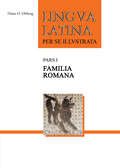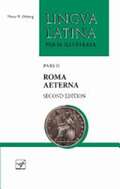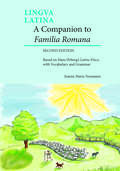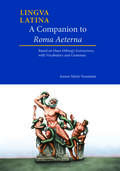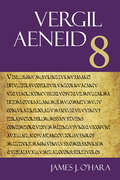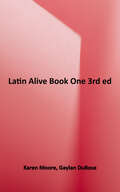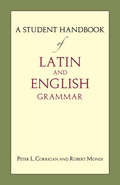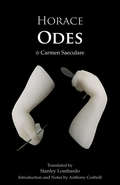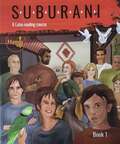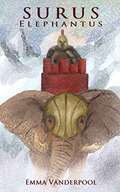- Table View
- List View
Familia Romana (Lingua Latina #1)
by Hans H. ØrbergHans Ørberg's Lingua Latina per se Illustrata is the world's premiere series for learning Latin via the Natural Method. The Natural Method encourages students to learn Latin without resorting to translation, but instead by teaching them to think in the language: students first learn grammar and vocabulary inductively through extended contextual reading and an ingenious system of marginal notes. Lingua Latina per se Illustrata is also the most popular series for those teachers at both the secondary and collegiate levels who wish to develop Latin conversational skills in the classroom.Familia Romana (the main book of Pars I of the Lingua Latina per se illustrata series) contains thirty-five chapters and describes the life of a Roman family in the 2nd century A.D. It culminates in readings from classical poets and Donatus's Ars Grammatica, the standard Latin school text for a millennium. Each chapter is divided into two or three lessons (lectiones) of a few pages each followed by a grammar section (Grammatica Latina) and three exercises (Pensa). Hans Ørberg's impeccable Latin, humorous stories, and the Peer Lauritzen illustrations, reproduced in full color, make this work a classic. The book also includes a table of declensions, a Roman calendar, and a word index (index vocabulorum). The Lingua Latina series incorporates the following features:The most comprehensive treatment of Latin grammar available in an elementary textbook.A vocabulary of almost 1,800 words, reinforced by constant and creatively phrased repetition, vastly expands the potential for later sight reading.A complete line of ancillary volumes, exercises, and readers both in print and online.
Lingua Latina: Pars II: Roma Aeterna
by Hans Ørberg"Roma Aeterna (the main book of Pars II of the Lingua Latina per se illustrata series) introduces some of the most celebrated authors of Roman antiquity through the lens of Roman literature and mythology. A vivid description of the city's monuments precedes a prose retelling of the first four books of Virgil's Aeneid, with many of the most famous passages in their original verse form. The selection from Virgil is followed by Book One of Livy's engaging mythical history of Rome's foundation. The prose selections are judiciously chosen and, in the first few chapters, gently adapted to provide students with a text that is authentically Latin and yet not difficult. The unadapted selections, which make up the majority of the text, are taken from Aulus Gellius, Ovid, Nepos, Sallust, and Horace. These annotated selections make Roma Aeterna useful both as the next step after Familia Romana and as a survey of Latin literature in its own right."--Publisher's description.
A Companion to Familia Romana: Based on Hans Ørberg's Latine Disco, with Vocabulary and Grammar
by Jeanne Neumann Hans H. ØrbergThis volume is the completely reset Second Edition of Jeanne Marie Neumann's A College Companion (Focus, 2008). It offers a running exposition, in English, of the Latin grammar covered in Hans H. Ørberg's Familia Romana, and includes the complete text of the Ørberg ancillaries Grammatica Latina and Latin–English Vocabulary. It also serves as a substitute for Ørberg's Latine Disco, on which it is based. As it includes no exercises, however, it is not a substitute for the Ørberg ancillary Exercitia Latina I. Though designed especially for those approaching Familia Romana at an accelerated pace, this volume will be useful to anyone seeking an explicit layout of Familia Romana's inductively-presented grammar. In addition to many revisions of the text, the Second Edition also includes new units on cultural context, tied to the narrative content of the chapter.
A Companion to Roma Aeterna: Based on Hans Ørberg's Instructions, with Vocabulary and Grammar
by Jeanne Neumann Hans H. ØrbergA sequel to her widely used A Companion to Familia Romana (now in its second edition), Jeanne Marie Neumann's A Companion to Roma Aeterna offers a running commentary, in English, of the Latin grammar covered in Hans H. Ørberg's Roma Aeterna, and includes the complete text of the Ørberg ancillaries Grammatica Latina and Latin–English Vocabulary II. It also serves as a substitute for Ørberg’s Instructions, on which it is based. Though designed especially for those approaching Roma Aeterna at an accelerated pace, this volume will be useful to anyone seeking an explicit exposition of that volume's implicitly presented grammar. In addition to many revisions of the text, A Companion to Roma Aeterna also includes new units on cultural context, tied to the narrative content of the chapter.
Aeneid 8 (The Focus Vergil Aeneid Commentaries)
by Vergil Mr James J. O'Hara Randall GanibanVergil: Aeneid 8 is part of a new series of commentaries on the Aeneid. Each volume adapts with extensive revisions and additions the commentaries of T. E. Page (1884, 1900), and is edited by a scholar of Roman epic. The present volume offers the Latin text of Book 8 along with maps, extensive notes, and commentary designed to meet the needs of intermediate students of Latin. A two-volume edition of the entire Aeneid designed to meet the needs of advanced students will be derived from the series.
Latin Alive! (Latin Alive Series #Book One)
by Karen Moore Gaylan DuBoseStudents will be delighted by what they learn in each new chapter of Latin Alive!, Book One, and they will learn to see that Latin is everywhere around them. As the first text in a three-year series, it is a rigorous and thorough introduction to this great language and is designed to engage upper school (middle and high school) student. Brimming with relevant facts and stories this text offers something for everyone. A Teacher’s Edition including answer keys, teacher’s helps and additional activities is available separately.
A Student Handbook of Latin and English Grammar
by Robert Mondi Peter L. CorriganThe study of classical languages by earlier generations of English-speaking students was greatly facilitated by the study of English grammar in the schools, a tradition now out of favor but one that emphasized precisely the concepts, terms, and constructions needed for the study of Greek and Latin.A Student Handbook of Latin and English Grammar offers a student-friendly comparative exposition of English and Latin grammatical principles that will prove a valuable supplement to a wide range of beginning Latin textbooks as well as a handy reference for those continuing on to upper-level courses.
Odes: With Carmen Saeculare
by HoraceHorace's Odes enjoys a long tradition of translation into English, most famously in versions that seek to replicate the quantitative rhythms of the Latin verse in rhymed quatrains. Stanley Lombardo, one of our preeminent translators of classical literature, now gives us a Horace for our own day that focuses on the dynamics, sense, and tone of the Odes, while still respecting its architectonic qualities.In addition to notes on each of the odes, Anthony Corbeill offers an Introduction that sketches the poet's tumultuous political and literary careers, highlights the Odes' intricate construction and thematic breadth, and identifies some qualities of this work that shed light on a disputed question in its reception: Are these poems or lyrics?This dual-language edition will prove a boon to students of classical civilization, Roman literature, and lovers of one of the great masters of Latin verse. The Amazon Kindle and other flowing-text eBook editions include the text of the Latin originals at the end of the book and the line numbers are enclosed in square brackets and embedded at the end of lines.
Suburani
by Hands Up EducationExcerpt from the back cover: "It's the spring of AD 64 and, as dawn breaks over the Subura in Rome, a young woman calls from high in an apartment building to her aunt working in a bar below. While her father collects the rent from the other tenants, a falling tile narrowly misses a senator's son passing through the streets in a litter. Was it an accident? In the Subura, your life hangs by a thread.
Surus: Fābula Bellī et Elephanti
by Emma VanderpoolSurus the Elephant is the mightest and largest elephant in the army and as such is Hannibal's favorite. The Carthaginian general has plans that will take his army, including men and elephants alike, from Africa, through Spain and Gaul, and directly into Roman territory. This novella recounts the stories of Surus the Elephant and his Mahout (elephant trainer) Mago as they recount their dangerous journey together to Italy. This book contains some 3,000 words total. Of which, there are 130 different words (excluding proper nouns). The book, with sheltered vocabulary and unsheltered grammar, is geared towards intermediate students.
